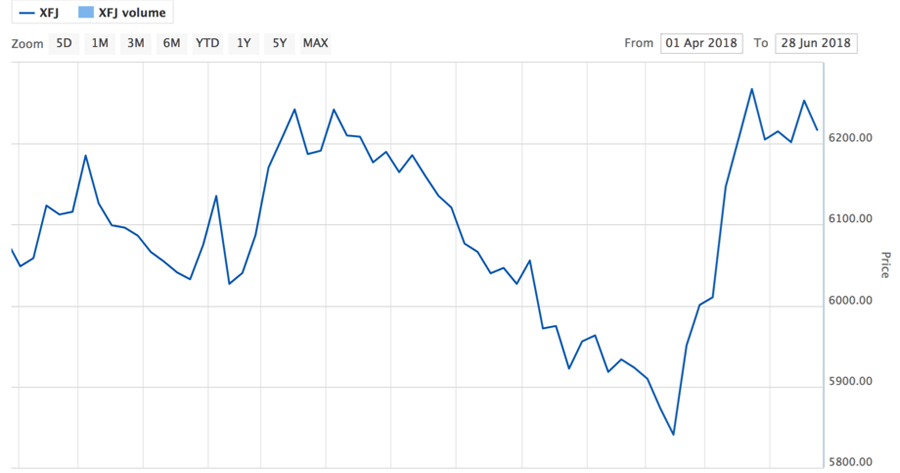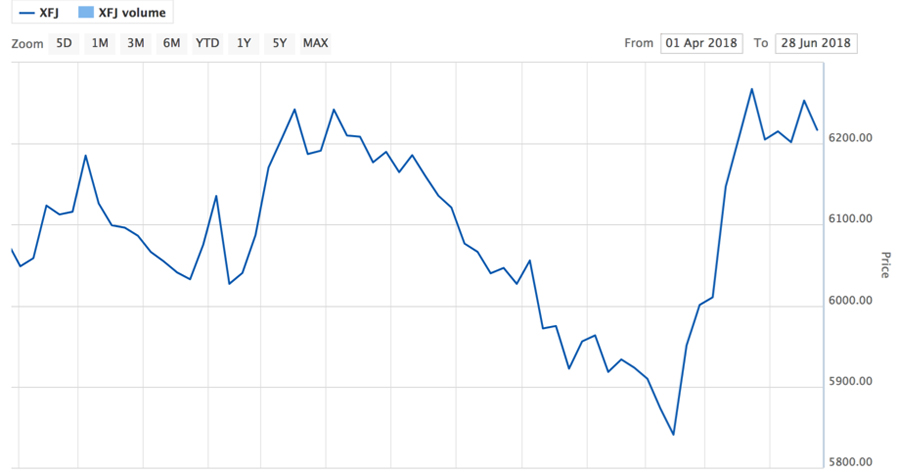
Although the Royal Commission into Misconduct in the Banking, Superannuation and Financial Services Industry is probably nowhere near its conclusion, it certainly has already had an impact on the public’s perception of the big banks.
CoreData’s recent research on trust revealed that in April 2018, less than half (49.0 per cent) of Australians trust the banks, compared to 60.8 per cent in February 2018.
Interestingly, however, the Royal Commission has not had a lasting impact on the big banks’ performance in the share market. The S&P/ASX 200 Financials Index, which is largely driven by the big banks, actually finished the quarter in the black. While the Index was relatively weak throughout April when the Royal Commission was on and weakened again after the Federal Budget in mid-May, it recovered quite strongly during the last few weeks of June.

Where’s the cause for concern?
Of course there are many factors that affect share market performance. However, if share prices remain strong despite the headwinds presented by the Royal Commission, Finance 101 tells us that profits are likely to remain strong. After all, share prices largely reflect investors’ expectations of the future, based on known information. So do the big banks actually have a real cause for concern here?
The sheer size and presence of the big banks meant that for most Australians, it was easy to become a customer of one when they were younger. And despite the various “bombs” the Royal Commission has uncovered so far, Australians do not appear to be abandoning the big banks in droves. Unless, perhaps, they have been affected personally by the past failures of the big banks, or if they know others who have been affected personally.
Let us give the big banks some credit here. They have been mostly quick to admit to their failings, make the appropriate apologies and either fix things up or make commitments to do so.
However, it is likely that most Australians remain loyal to the big banks due to inertia. Consumers generally dislike major changes, which typically create perceptions of hassle and risk. The tendency to avoid these perceptions means that the status quo is likely to be rationalised, creating misguided loyalty.
Should I stay or should I go?
In other words, for most Australians, it is probably easier to stay as a customer of one of the big banks than to switch to one of the smaller players. Although smaller banks typically have quite competitive offers when compared to the big banks, most Australians probably believe that sticking with the devil you know is the easier option.
It is well publicised that in general, the big banks do not proactively reward the loyalty of long-term customers and that the costs to consumers of misguided loyalty could be substantial. But the big banks do not really need to reward loyal customers, given the extent of consumer inertia. Instead, the focus is typically on attracting new customers, whom they are confident of retaining once the inertia kicks in.
This is why the better deals are typically only offered to new customers and not existing customers, who may only get the better deals if they ask for them or if they threaten to switch. This practice is not restricted to the big banks of course, with countless examples of companies in other sectors, including insurance, telecommunications and utilities, doing the same – they are also smart enough to recognise the extent of consumer inertia, and are taking advantage of it.
While the Royal Commission has had several high-profile casualties, banking on inertia likely means that by and large, it will be mostly business as usual for the big banks. I could be completely wrong of course, but so far, the strategy has meant that while the big banks may be bruised, they certainly are not broken.
Unless of course, there is something significant enough that we previously did not know about. Only time will tell.
Follow CoreData on LinkedIn: www.linkedin.com/company/coredata-group/
